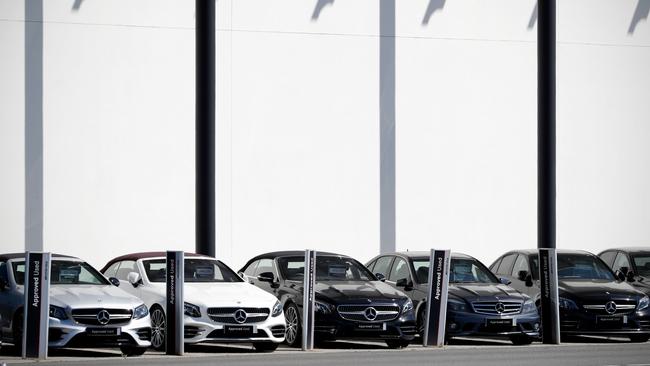Carmakers call for abolition of luxury car tax
Auto brands from Toyota to Audi and Mercedes-Benz are calling for the Morrison government to dump its luxury car tax.

Auto brands from Toyota to Audi and Mercedes-Benz are calling for the Morrison government to dump its luxury car tax, and the states to provide stamp duty relief to help struggling dealers after new car sales crash to their lowest levels in 30 years in the wake of the COVID-19 pandemic.
The two taxes comprise about 10 per cent of the cost of a $70,000 car, on top of GST, which is another 10 per cent. Carmakers say it is “a tax on a tax” and axing it would provide an urgent stimulus to car dealers.
And it is not just applied to prestige brands. Toyota sales attracted the highest luxury car tax (LCT) total in 2019: $119m.
The Toyota LandCruiser was the model capturing the most LCT, with a drive-away price of about $87,000, and popular among tradies and families. The smaller Prado and family SUV Kluger were also subject to LCT.
“We believe that the LCT is an unfair impost on Australians and the automotive industry, as it applies only to vehicles and not to other items,” a Toyota Australia spokeswoman said.
“Motorists already significantly contribute to government revenue when purchasing a vehicle through GST, stamp duty and registration fees.
“In 2019, Toyota customers paid approximately $119m in LCT, which applied to the 42,790 Landcruiser, Prado, Kluger, Supra and Granvia models sold.
“We will continue to work with our industry body, the FCAI (Federal Chamber of Automotive Industries), on this issue.”
The Howard government introduced LCT in 2001. It attracts a rate of 33 per cent for vehicles priced at $68,740 or more. Meanwhile, fuel-efficient vehicles have more flexibility, with the LCT threshold set at $77,565.
Advocates for its abolition argue LCT unfairly singles out cars, with yachts, private jets, jewellery and designer handbags not attracting a similar tax. The Howard government envisaged LCT balancing the withdrawal of the wholesale sales tax following the introduction of the GST in 1999.
“As a result of the introduction of the GST together with the abolition of WST, motor cars in general would fall in price,” the then government said in its bill in 1999.
“Luxury cars, however, would fall in price even more dramatically as they are currently subject to 45 per cent WST on the value above a ‘luxury’ threshold, as opposed to 22 per cent WST which applies generally.”
Twenty-one years later, LCT critics say it is outdated, while it has become a sticking point in free trade negotiations with the EU, which as a bloc is Australia’s second-biggest trading partner, with two-way trade worth $114bn.
European car manufacturers have called for the tax’s removal as part of FTA negotiations, which began in June 2018, saying it does not constitute free trade. Currently, there is a 5 per cent tariff on imported cars from Europe, which is in addition to LCT and GST.
Australian Automotive Dealers Association chief executive James Voortman said LCT was disincentivising drivers from optioning their cars with non-standard safety features, such as blind spot indicators, 360 degree cameras and active cruise control.
“It is disappointing that the LCT applies to accessories and added features which discourage consumer uptake of safety technology due to concerns it will push their new vehicle over the threshold,” Mr Voortman said. “The tax should have been abolished years ago and at a minimum it should be reformed by substantially raising the threshold; excluding accessories from being captured; and exempting fuel-efficient cars.”
Audi Australia managing director Paul Sansom said removing the tax would help the automotive sector recover from COVID-19, which had resulted in monthly new car sales falling to their lowest levels in almost 30 years.
New car sales fell 35.3 per cent in May, compared with the same month last year, recording the biggest May sales drop since 1991.
“Without local auto manufacturing, the LCT is redundant and is effectively a tax on some of the safest, most innovative and most efficient vehicles on the market,” Mr Sansom said.
BMW Australia chief executive Vikram Pawah said the LCT “does not provide a level playing field”, while Mercedes-Benz spokesman Sasha Trakilovic said state and federal governments could co-operate to achieve tax reform.




To join the conversation, please log in. Don't have an account? Register
Join the conversation, you are commenting as Logout